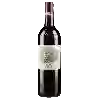
Château FourreauGrande Réserve Bordeaux
In the mouth this red wine is a powerful with a nice balance between acidity and tannins.
This wine generally goes well with poultry, beef or veal.
Taste structure of the Grande Réserve Bordeaux from the Château Fourreau
Light | Bold | |
Smooth | Tannic | |
Dry | Sweet | |
Soft | Acidic |
In the mouth the Grande Réserve Bordeaux of Château Fourreau in the region of Bordeaux is a powerful with a nice balance between acidity and tannins.
Food and wine pairings with Grande Réserve Bordeaux
Pairings that work perfectly with Grande Réserve Bordeaux
Original food and wine pairings with Grande Réserve Bordeaux
The Grande Réserve Bordeaux of Château Fourreau matches generally quite well with dishes of beef, veal or game (deer, venison) such as recipes of puchero, fillet of beef with morels or roast duck with cider sauce.
Details and technical informations about Château Fourreau's Grande Réserve Bordeaux.
Discover the grape variety: Johanniter
An interspecific cross between Riesling and FR 589-54 (Seyve-Villard 12481 x (pinot gris or rülander x chasselas or gutedel)) obtained in Germany in 1968 by Johannes Zimmermann. It has the particularity of having only one gene for resistance to mildew and powdery mildew. This variety can be found in Germany, Belgium, Switzerland, the Netherlands, etc. In France, it is practically unknown. Note that the "Johanniter" grape variety is a protected trademark.
Informations about the Château Fourreau
The Château Fourreau is one of of the world's greatest estates. It offers 7 wines for sale in the of Bordeaux to come and discover on site or to buy online.
The wine region of Bordeaux
Bordeaux, in southwestern France, is one of the most famous, prestigious and prolific wine regions in the world. The majority of Bordeaux wines (nearly 90% of the production Volume) are the Dry, medium and Full-bodied red Bordeaux blends for which it is famous. The finest (and most expensive) are the wines of the great châteaux of Haut-Médoc and the right bank appellations of Saint-Émilion and Pomerol. The former focuses (at the highest level) on Cabernet Sauvignon, the latter on Merlot.
The word of the wine: Village
Term used in certain regions to identify a particular sector within a larger appellation (Beaujolais, Côtes-du-Rhône).














